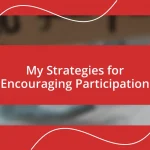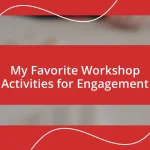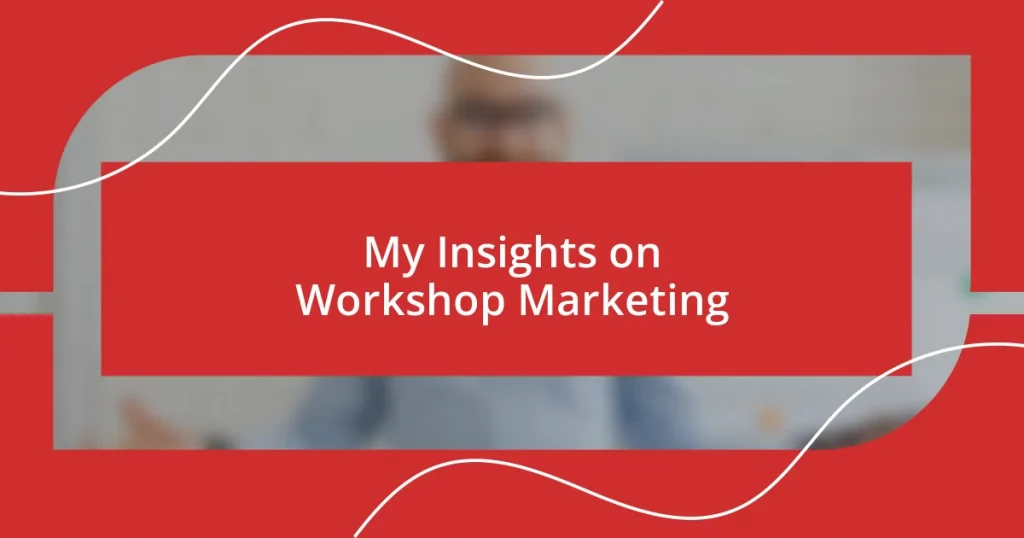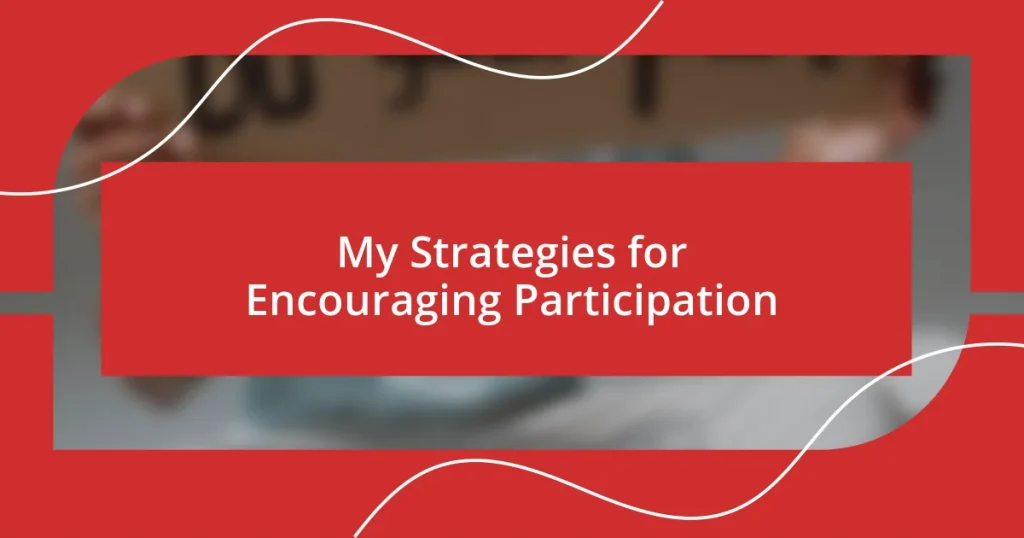Key takeaways:
- Identifying and understanding your target audience is essential for tailoring workshop content and marketing effectively.
- Engaging workshop content should incorporate interactive elements and visual aids to enhance participant experience and retention.
- Utilizing social media and email marketing can significantly increase workshop visibility and participant connection, while measuring success through qualitative and quantitative metrics informs future improvements.
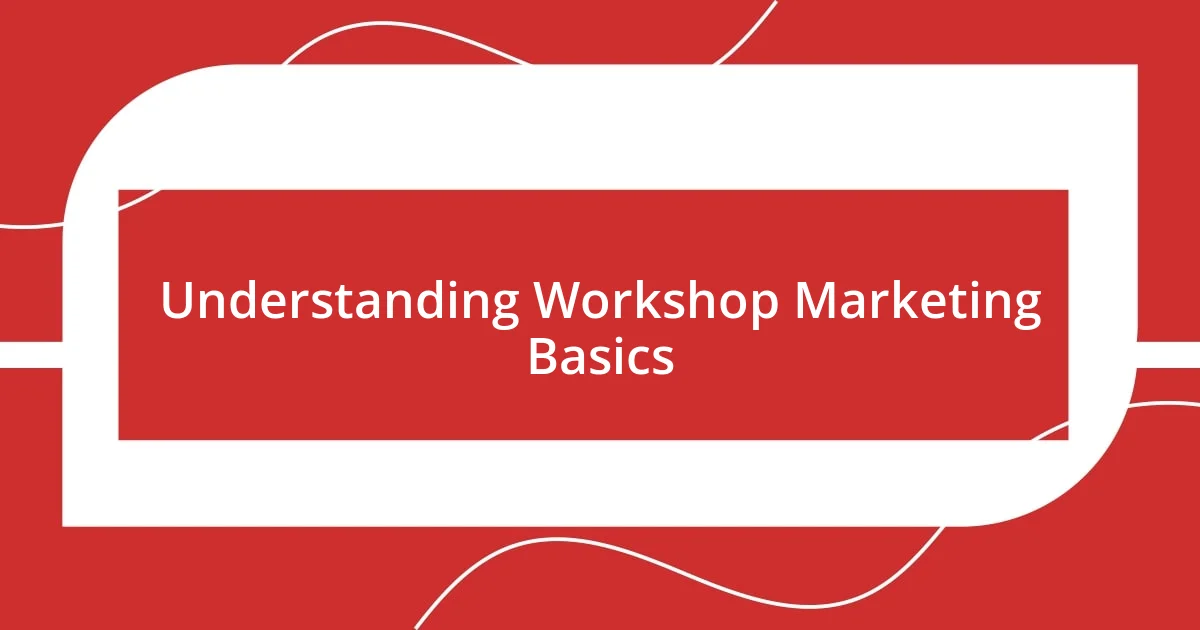
Understanding Workshop Marketing Basics
Workshop marketing is all about connecting with your audience in a meaningful way. Think about it: have you ever attended a workshop that completely transformed your understanding of a topic? That’s the magic of effective marketing—it creates a space where potential participants feel motivated to join. I remember the first workshop I attended that really resonated with me; the energy in the room was infectious, and it all started with a compelling invitation.
When crafting your marketing strategy, consider your audience deeply. Who are they, and what challenges are they facing? I’ve found that when I tailor my message to address specific pain points, the response is overwhelmingly positive. One time, I organized a workshop on time management, emphasizing the struggle of balancing work and personal life. I could see the nods of recognition from participants, and their engagement skyrocketed.
Also, never underestimate the power of storytelling in your marketing materials. Sharing personal experiences or success stories can build instant rapport and trust. I often weave in a narrative about how a particular concept helped me overcome a hurdle—this not only brings a human touch to your promotion but also sparks curiosity. So, what’s your story? How can you create an emotional connection that drives participants to sign up?
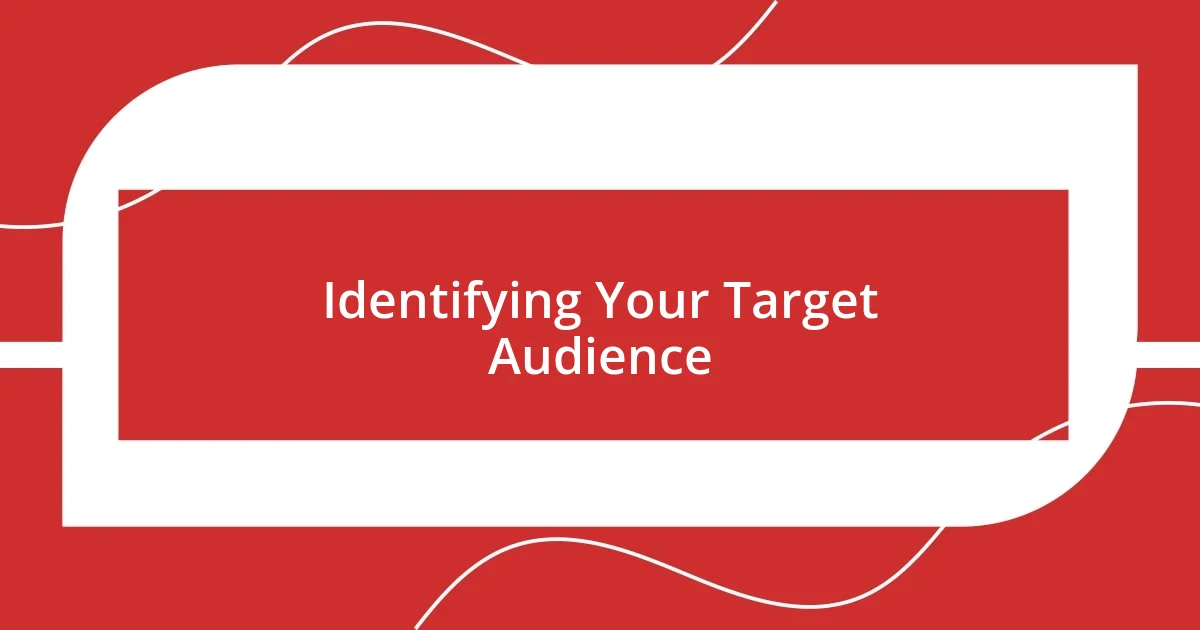
Identifying Your Target Audience
Identifying your target audience is crucial when it comes to workshop marketing. I remember hosting a workshop on digital marketing trends. At first, I thought anyone interested in tech would be my audience. However, after some deep dives into my potential attendees’ needs, I realized small business owners craved guidance on leveraging these trends. Understanding their specific challenges helped me tailor the content, making it far more engaging and relevant.
To pinpoint your ideal audience, consider the following:
- Demographics: Age, gender, occupation, and education level can guide your messaging.
- Interests: What hobbies or passions does your audience have? This shapes workshop themes.
- Pain Points: What are the biggest challenges they face? Addressing these can create a compelling reason to attend.
- Goals: What do they aspire to achieve? Highlighting how your workshop helps meet these goals is key.
- Feedback: Don’t hesitate to ask previous participants about their needs and preferences; their insights can be invaluable.
Every time I adjust my marketing based on my audience’s feedback, I notice a significant increase in engagement and registrations. It’s all about creating that connection and showing them how your workshop can benefit them personally.
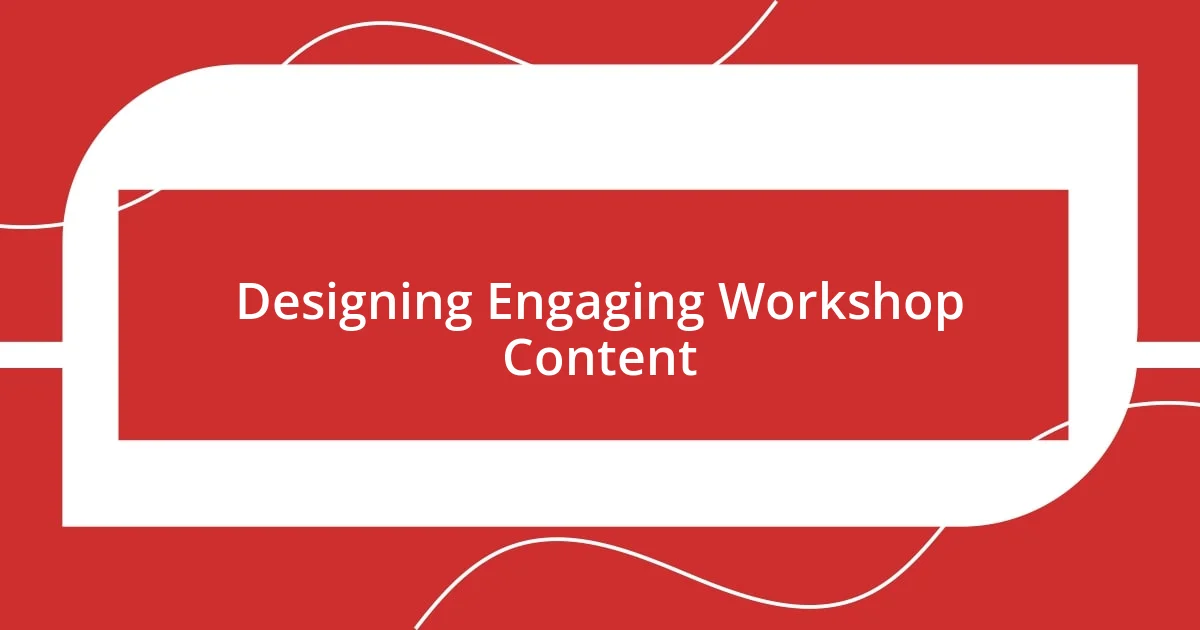
Designing Engaging Workshop Content
When designing engaging workshop content, I focus on interactive elements that keep attendees involved. For instance, in a workshop on creative writing, I incorporated group storytelling exercises. Watching participants collaborate and build narratives together was magical—it transformed their initial hesitation into excitement. The energy in the room became palpable as they realized that their ideas were valid and worthy of expression.
Visual aids also play a crucial role in crafting compelling content. I once attended a workshop where the facilitator used vibrant infographics to illustrate complex concepts. This approach not only simplified the information but also made it memorable. It reminded me of how essential it is to present ideas coherently. A well-designed slide can stick with participants long after the session ends, sparking conversations long after they leave the room.
Ultimately, the goal is to create a space where participants feel valued and inspired to contribute. I often leave room for Q&A, not just as a formality, but as a genuine opportunity for interaction. One of my most rewarding experiences was when a participant took the discussion in a new direction, providing insights that even I hadn’t considered. These moments of shared discovery are what truly make a workshop engaging.
| Interactive Elements | Visual Aids |
|---|---|
| Group storytelling exercises | Infographics for clarity |
| Hands-on activities | Dynamic presentations |
| Feedback sessions | Relevant images |
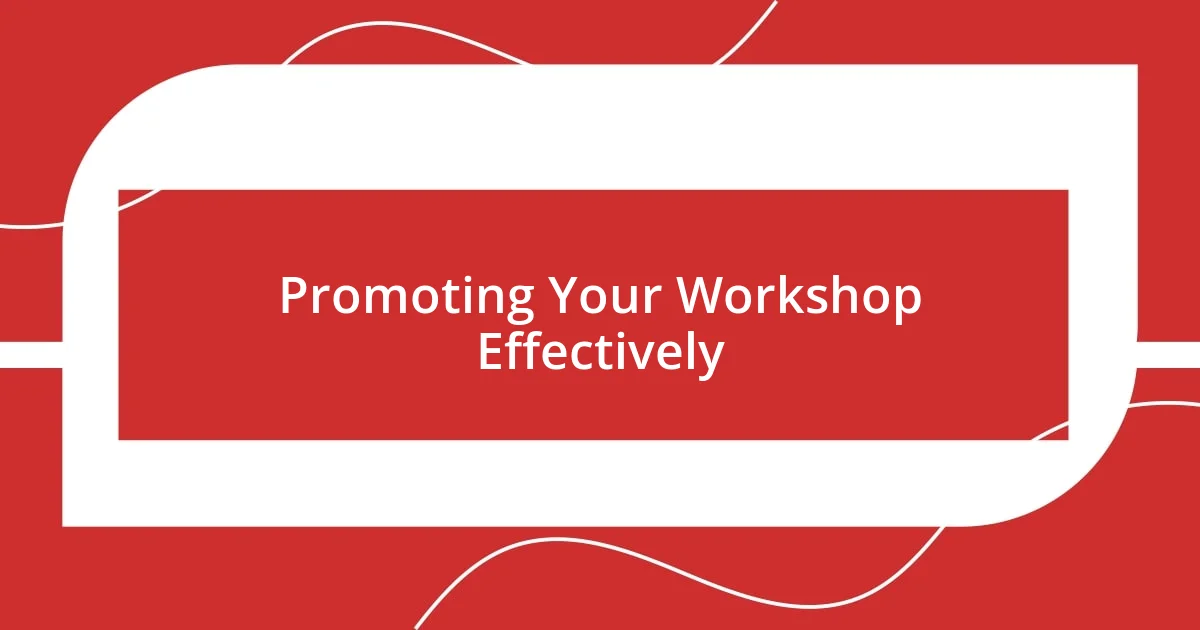
Promoting Your Workshop Effectively
To promote your workshop effectively, leverage social media platforms. I recall launching a workshop on mindfulness where I created engaging posts featuring short meditation snippets. The response was overwhelming! People resonated with the bite-sized content, leading to a significant uptick in registrations. Social media not only broadens your reach but also allows for real-time engagement—are you utilizing your online presence to its fullest potential?
Email marketing is another powerhouse for reaching potential attendees. I’ve had great success crafting newsletters that provide valuable insights coupled with an invitation. When I sent out a personal story about my own journey into mindfulness, I noticed how it connected with my audience on an emotional level. Utilizing a personal touch in your emails can create a deeper connection and inspire individuals to join your workshop.
Collaborating with local businesses or influencers also amplifies your workshop’s visibility. I once partnered with a local coffee shop to host my workshop on productivity techniques, and they shared the event with their customers. This collaboration made the workshop feel more integrated into the community, encouraging more sign-ups. Have you thought about who you might partner with to enhance your promotional efforts? It could lead to unexpected opportunities!
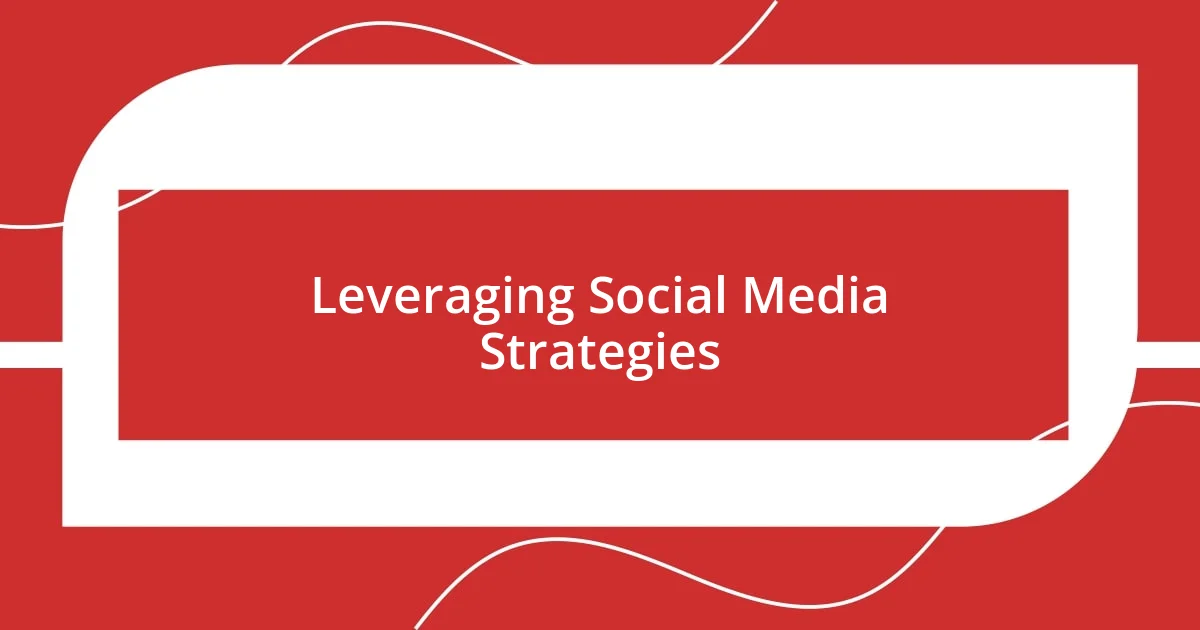
Leveraging Social Media Strategies
Utilizing social media strategies is a game changer when it comes to workshop marketing. I remember creating an Instagram story series for a leadership workshop I hosted. Each segment featured quick tips and behind-the-scenes peeks, which sparked curiosity and a steady flow of inquiries about the event. It highlighted how essential it is to engage your audience where they are most active—on their phones.
Another interesting approach I’ve tried is hosting live Q&A sessions on Facebook right before my workshops. This tactic not only allows potential attendees to feel connected but also serves as a platform for them to voice their concerns. I had several participants express their apprehensions about public speaking, which led to tailored content that directly addressed their needs. How often do you create opportunities for open dialogue?
Moreover, curated content that showcases testimonials can dramatically enhance credibility. After a successful workshop, I shared video clips of attendees sharing their transformational experiences. The emotional authenticity was palpable, and it motivated others to sign up, driven by the desire to experience that same growth. Have you considered how sharing your past attendees’ journeys can amplify your reach and impact?
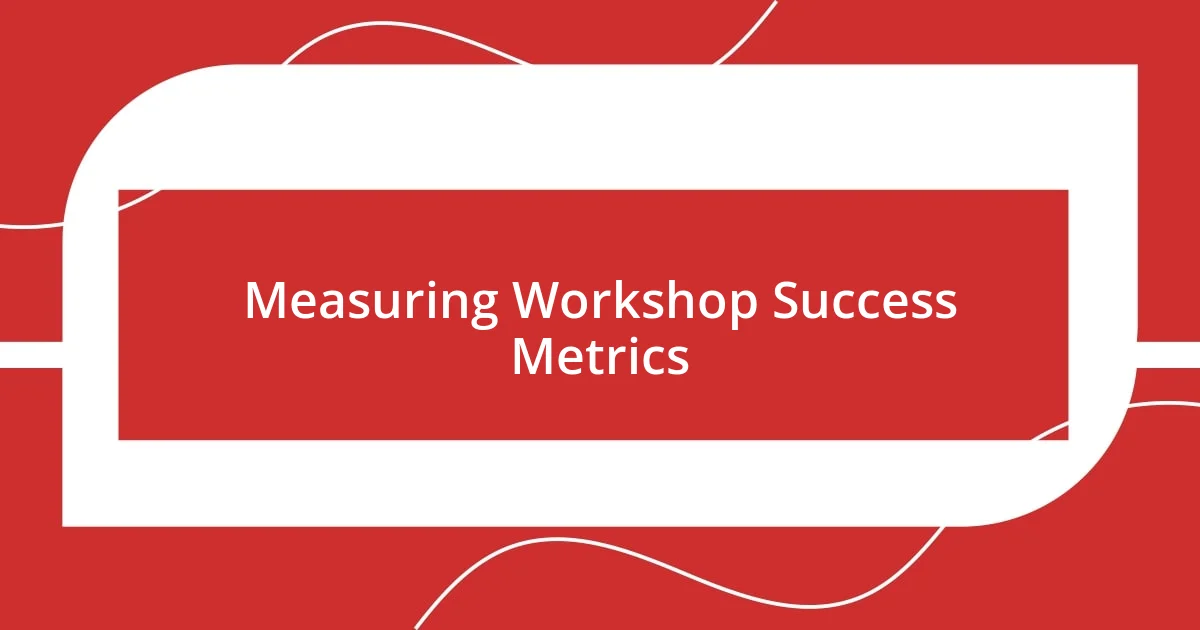
Measuring Workshop Success Metrics
Measuring the success of my workshops has always been a blend of quantitative and qualitative metrics. Once, after a workshop on creativity, I meticulously tracked attendance rates and participant feedback forms. I discovered that while attendance was good, the real goldmine came from the insightful comments about how energizing and actionable my content was. How often do you take the time to sift through qualitative feedback to find those nuggets of insight?
Another key aspect I focus on is the level of engagement during and after the workshop. For example, during my recent session on digital marketing, I noticed participants actively discussing ideas in breakout groups. Their interactions weren’t just surface-level chatter; they were deeply engaged with the material. Following up with a quick survey, I asked, “What part of today’s workshop resonated most with you?” The responses were both encouraging and enlightening, sparking ideas for future topics. Isn’t it exciting when your audience reveals their interests that can guide your next steps?
Moreover, retention rates for follow-up workshops serve as a pivotal metric in my reflections. I once ran a series on emotional intelligence and saw many return for the advanced sessions, which was a strong indicator of value. Their commitment affirmed that I was hitting the mark with my content delivery. How do you gauge whether your audience is eager to continue learning? Tracking such metrics can significantly shape your future workshops.
